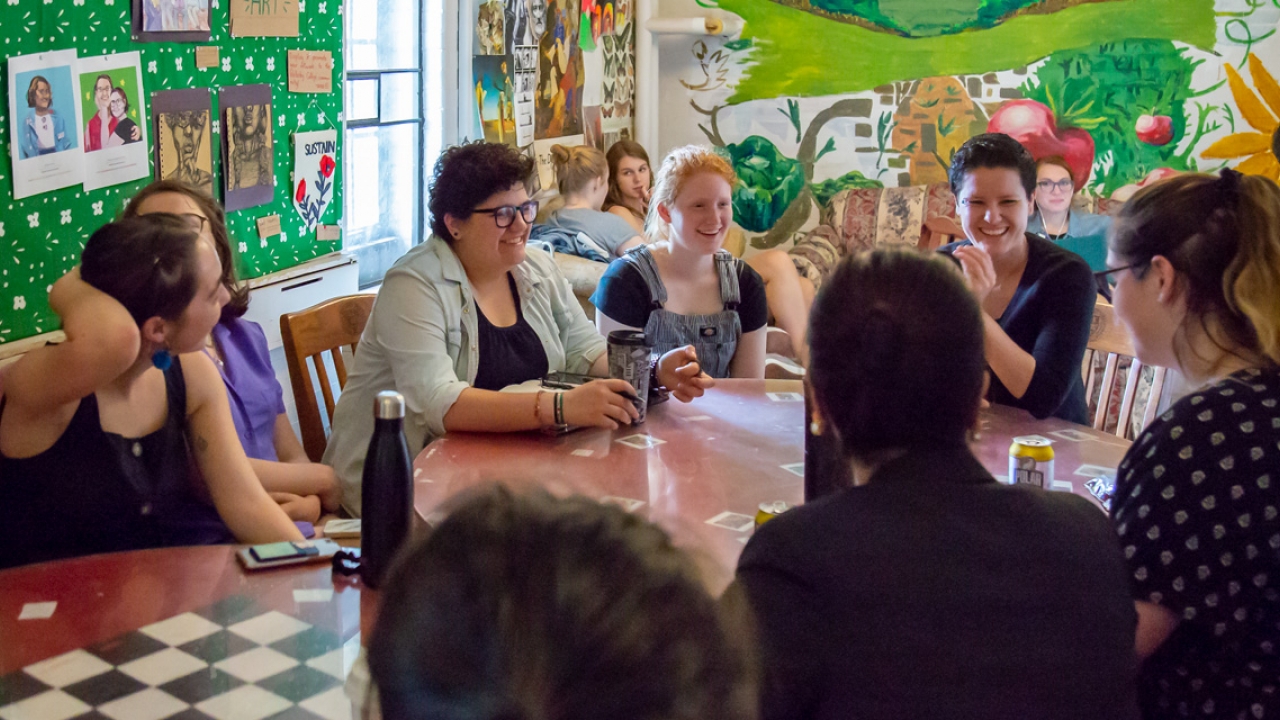Steering Committee Member of ICAN, 2017 Nobel Peace Prize Awardee, Discusses Nuclear Disarmament with Students

In July 2017, the United Nations adopted the Treaty on the Prohibition of Nuclear Weapons—a development that has been seen as a significant step toward the destruction of all nuclear weapons and a ban on their use.
Ray Acheson participated in the treaty negotiations as a steering committee member of the International Campaign to Abolish Nuclear Weapons (ICAN), which received the Nobel Peace Prize in 2017 for its efforts to win international support for the treaty. She came to Wellesley on May 4 to give a talk titled “Banning the Bomb: Feminism, Global Activism and International Diplomacy.” Daily Shot writers caught up with Acheson, who spoke at Pendleton East Atrium in an appearance presented by the Peace and Justice Studies Program.
Daily Shot: Who inspired you to pursue your work with nuclear disarmament?
Ray Acheson: I got my start in this issue when I did an internship with a woman named Randi Forsberg in Cambridge, Mass. She was a leader in the nuclear freeze movement in the 1980s and had been this incredible force for nuclear disarmament. Working for her was the first time that I had been exposed to the nuclear weapons issue.
She taught me a lot about nuclear weapons and the anti-nuclear movement, and once I graduated from the University of Toronto I really wanted to find something in this field if I could, and ended up at the Women’s International League for Peace and Freedom (WILPF). [Acheson is the director of Reaching Critical Will, WILPF’s disarmament program.]
Once I learned about the history of this issue, I was really motivated to stay involved in it. It was an issue of justice and morality for me more than anything else. This idea that a few countries in the world could have the power to destroy the entire planet, that they have entire strategies built around the incineration of cities and millions of human beings, it was just repulsive. I didn’t understand how that situation had been able to continue for so long.
DS: What role have women played in the movement to ban nuclear weapons?
Acheson: Women have been in forefront of antinuclear movement since the dawn of the atomic age. They really have been leaders in challenging nuclear weapons at sites of production, around nuclear testing, and in calling for complete elimination both here in the United States but also in western Europe and in other countries.
In this process to develop a treaty to prohibit nuclear weapons, women have also been leaders within ICAN and WILPF, bringing in rich feminist history and feminist analysis to the process. Typically, women have been in the forefront on the anti-nuclear activist side but the diplomacy and policy side is usually dominated by men, and to see that shift when it came to this treaty process was really interesting.
DS: In the negotiations process for this treaty, what was one of your greatest roadblocks?
Acheson: The power of nuclear arms states has been the biggest roadblock. They have not wanted us to develop this treaty to prohibit nuclear weapons. They have tried to pressure other countries to not support the negotiations and not join in now that it has been negotiated and adopted by the United Nations. It comes from a position of wanting to maintain their power in the world, to maintain the status quo, their privileged position in that they have the most destructive weapons on earth. Only nine of them have nuclear weapons, so it’s a small club and they want to keep to keep it as a club.
DS: How did you overcome that obstacle?
Acheson: We were able work with the vast majority of other governments in the world who agreed that nuclear weapons are unsafe and unjust. This helps with the process of stigmatizing these weapons.
DS: What will happen next?
Acheson: Now, we are working on ensuring that the treaty is ratified by the most states possible. We have 122 who voted for its adoption in the UN, and now they each have to join nationally. They voted for it but they have to put it into law into their own countries.
The other thing we are doing is promoting this treaty within countries that don’t support it. These are nuclear arms states and some of their non-nuclear allies.
DS: What advice do you give to young women who want to make an impact in the world?
Acheson: Get active and stay active in whatever issues you are most concerned about. Don’t wait. Just jump in. Get involved, whether it’s joining an organization or a campaign. Don’t be discouraged by those who tell you that you can’t create change. That’s the number one problem activists face.
Photo: Ray Acheson (right) speaks to a group of students at El Table.



